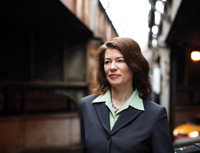 In Jayne Stoyles’ Ottawa office, hope confronts horror. She’s the executive director of the Canadian Centre for International Justice (CCIJ), a feisty non-profit that fights for international criminal justice. The office, with its four basic desks, is only a nerve centre. “I work to leverage the skills and interests of a national network of over one hundred people,” she says.
In Jayne Stoyles’ Ottawa office, hope confronts horror. She’s the executive director of the Canadian Centre for International Justice (CCIJ), a feisty non-profit that fights for international criminal justice. The office, with its four basic desks, is only a nerve centre. “I work to leverage the skills and interests of a national network of over one hundred people,” she says.
Using new frameworks of international human rights law, the CCIJ acts to bring to justice people living in Canada who are accused of war crimes, crimes against humanity, torture and other atrocities. The registered charity also helps victims of such crimes seek compensation, as well as educating media, lawyers, community groups and front-line workers on the issues. The CCIJ seems like a model of 21st century activism: a shape-shifting network swirling around a vibrant central hub with Canada-wide nodes and fibre optic outlets around the world.
“This is a way for me to work in solidarity with people around the world,” Stoyles says, “and it’s a way of helping that’s not paternalistic.”
Their highest profile case to date concerns Zahra Kazemi, an Iranian-Canadian photojournalist who was arrested in Iran in 2003 while photographing a protest outside a prison. She was beaten, tortured and raped by prison officials before dying in hospital. The CCIJ is supporting her son Stephan as a legal intervenor while he campaigns for the identification of those responsible by Iran’s government, and the condemnation of officials’ actions in a Canadian court.
Stoyles became a lawyer to do human rights work, but when she was fresh out of law school, it wasn’t easy finding a job in the field. “The first step was very hard,” she says. “There was absolutely no support in the form of concrete advice or contacts from anyone in the legal environment. I had to jump with no idea where I would land.”
She landed at the Canadian Red Cross, working on an international campaign to ban land-mines before moving to New York City to coordinate the successful effort to establish the International Criminal Court in the Hague, the Netherlands, in 2002. That same year, Stoyles returned to Canada to start a family.
She learned about the CCIJ in 2003 when it existed only on paper. It was enough to attract her energy and leadership — and seven years later it’s a cross-country phenomenon. To sustain its growth, Stoyles plans to follow the example of Pivot Legal Society, a Vancouver- based anti-poverty legal advocacy organization that has a partner, for-profit firm. The new firm would do traditional legal work but run on progressive principles such as inclusive decision-making and transparency and would share revenues with the CCIJ.
“We try to have an organization that’s an avenue for all kinds of people to get engaged,” Stoyles says. By that she means everyone from those who’ve suffered rights abuses to lawyers and law students to health care professionals. In fact, it was a grant to work with young people that got the CCIJ off the ground. “The shoestring budget, the long hours, it’s just motivating,” she says. “It’s easy to work hard when you think you could be ending human rights abuses.”
The Lowdown: Jayne Stoyles
Current Job: Executive Director, Canadian Centre for International Justice
First Job: Summer student at National Defence
Greatest Frustration: Big box stores
Proudest Moment: Entry into force of International Criminal Court treaty
Favourite Law Movie: Should be Judgment at Nuremberg, but it’s Liar Liar
Personal Style: Type A with a sprinkling of B

